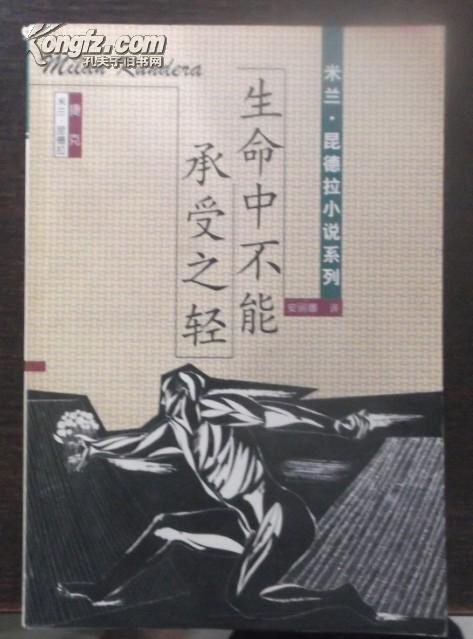
《生命中不能承受之轻》回旋生命中之重
书名:生命中不能承受之轻
1
0

小棉袄 2023-06-13 23:54:28
Mulan Kundera was born into a musical family and had a great deal of expertise in music, which also influenced his writing. This book is like a grand and delicate symphony that resonates with readers emotions and thoughts through the repetition of music. The main historical background of the novel is the Prague Spring event. The failure of democratic reform and the armed invasion of the Warsaw Pact countries led to countless people being displaced. The main characters of the novel also experienced their own lives during this heavy and absurd special historical period.
Thomas and Teresas story is a collision of lightness and weight, a intertwining of spirit and flesh. From a textual perspective, several chapters with these two sets of words as titles have almost the same connotation, and they are closely related and intertwined. Is the flesh heavy and the soul light, or is the flesh light and the soul heavy? We all know that the "roundabout form" is to repeatedly state a basic theme and insert different refrains as a contrast. The book plays Thomas and Teresas life movements in this way. "Lightness and Weight" in the first part mainly focuses on Thomass life experience and his encounter and relationship with Teresa, showing the changes in the lives of several main characters in a fast-paced narrative. In addition to the fast-paced story, the author also left a lot of space, like a kind of summoning, stimulating our strong curiosity, which was answered in the second part.
What is lightness and weight? For Thomas, "lightness" is cutting off social relationships that require him to pay a price and abandoning all responsibilities and obligations. It is a way of life that is free and unrestrained. The relationship between people and values is inherently linked, and heavy values are inherently valuable. Therefore, Teresas "sympathy" turned him from light to heavy. In the book, I prefer to understand sympathy as "empathy" in the Chinese language system. In Baiers "Ethical Systems," he states, "The human mind is not only easily excited by sympathy, but it also deeply desires to communicate its emotions to other minds and get their reactions to these emotions." The sympathy in Kunderas pen refers to the art of spiritual empathy that can share joys and sorrows with others while sharing other emotions. Sympathy was aroused, and Teresa, like a child in a basket, stirred Thomass sympathy, so that he was transformed from light to heavy. Thomas, who indulges in freedom, developed a desire for Teresas protection and sense of responsibility, and was also immersed in this kind of empathy among people. However, the desire and lust drove him to seek warmth and lightness, and the sense of responsibility for Teresa ultimately became an iron ball on his ankle. He continued to cheat, like a sex addict, having sexual relations with other women, trying to return to the life he once believed he was destined to have before meeting Teresa. However, Teresas departure made him miss the state of being heavy. Therefore, just a week later, he left Zurich and returned to Prague. When he uttered the phrase "the fate voice" of Beethoven, he seemed to be his own hero. He also regarded himself as Teresas hero, lifting the heavy burden for her. Of course, this did not make him a faithful person. He kept swinging between lightness and weight throughout his life.
The second part, "Soul and Body," reappears the plot of the first part like a roundabout. In combination with the interaction between the two parts, it also has its own mission. While narrating, it also infiltrates some spiritual experiences and changes that are more prominent for Teresa. For example, forgetting hunger because of the strong expectation of love, the spiritual resonance between her and Thomas, the mismatch between two refracted and colorful spirits, the nightmares she experienced because of Thomass unfaithfulness and promiscuity, and her attempt to sever her mothers influence on her body by using willpower, and the wonderful connection between her and Sabina while being naked... All these eventually form a turbulent and desperate female image. Teresa loves Thomas deeply. In Thomass eyes, Teresa seems to be like a child in a basket floating down the river, arousing his infinite sympathy and love. But for Teresa, looking for Thomas was the greatest courage when her young life burst out with the greatest vitality. It was taking care of her brightest and only light after experiencing a life journey of nine deaths and one life.
For Teresa, lightness is an overly idealistic and beautiful pursuit, an escape from the original family, and an embodiment of the ideal life in a distant civilized city. It is a somewhat "childish" view of love in the cruel reality. In the world controlled by her mother, the body is humiliating and shameful, and she wants to prove that her body is unique and valuable. After meeting Thomas, Teresas pursuit of lightness invested all her idealism and love. However, Thomass unfaithfulness and fascination with different womens bodies have made her once again deeply disgusted with herself. Teresa was thrown back into the world she was in before. Love made her personality reincarnation and death. The long-term oppression and distorted values instilled by the lover made her already fragile self shrink in acquired helplessness, and the heavy shackles were tempted and attracted by the emptiness under her. She wanted to jump down. The desire to fall was sweet and gentle, but it also made her want to return to the abyss of pain.
相关推荐
萤火谷的梦想家
艾莉森•麦吉出生于1960年,是美国《纽约时报》畅销书作家,同时也是大都会州立大学创意写作课的教授。她的作品被翻译成20多种语言并出版,也曾被提名普利策奖,并获得苏斯博士奖金奖、克里斯托弗图书奖、美国 [美]艾莉森•麦吉/[美]克里斯托弗•丹尼斯/绘 2023-03-27 16:50:25鬼马女神捕1·绝密卧底(上)
腹黑凤凰vs毒舌鸡妖——蓝翎:“小姬,跟我去人界吧!”姬十四:“干吗?让人宰了我做小鸡炖蘑菇吗?”蓝翎:“不啊,让妖怪宰了你做小鸡炖蘑菇更气派。”凤凰蓝翎和鸡妖姬十四生活在无忧无虑的灵界。他们的故乡叫 郝天晓 2023-04-17 00:22:47© 2023-2025 百科书库. All Rights Reserved.












发表评价